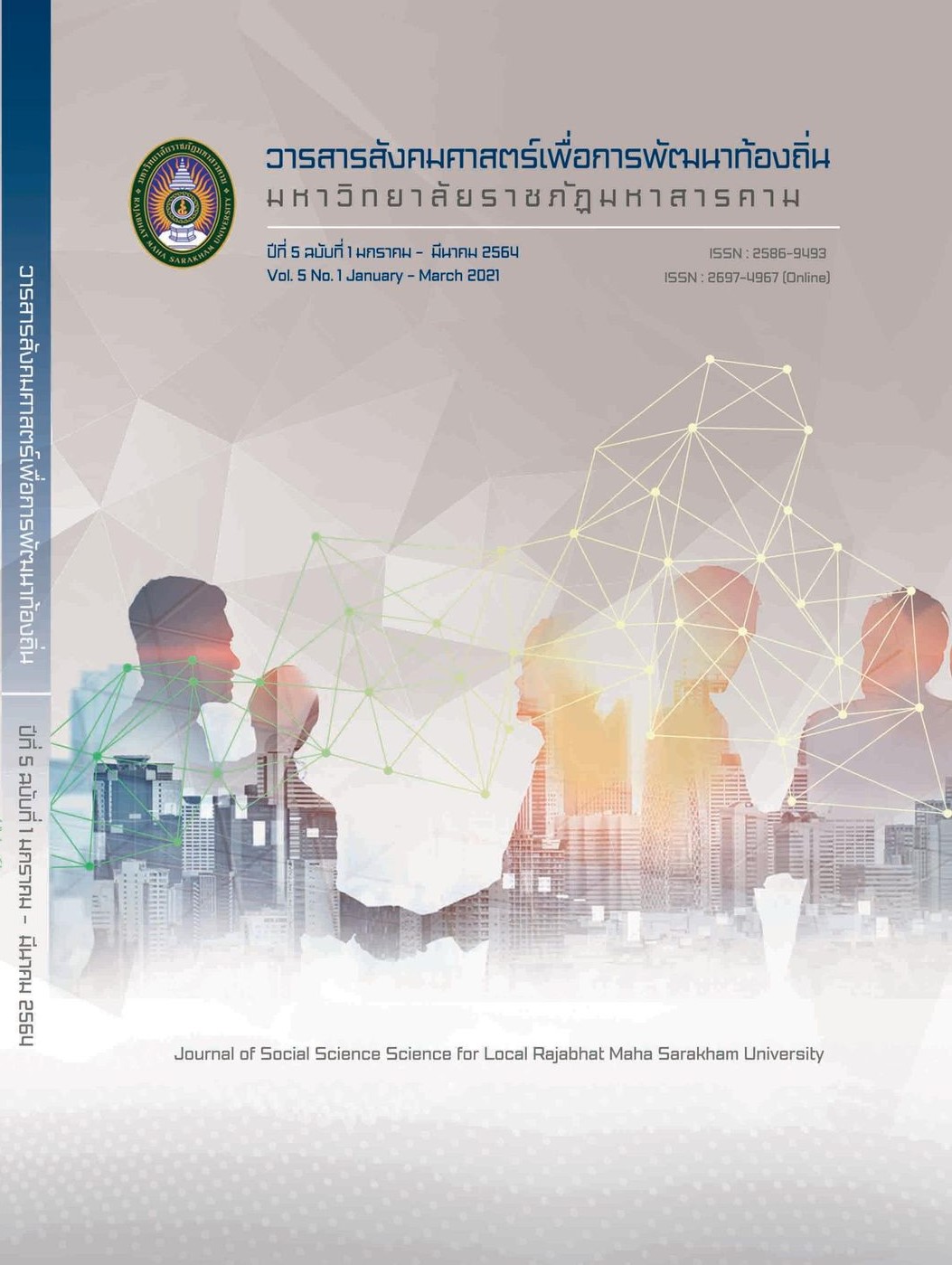รูปแบบการจัดการขยะมูลฝอยของประชาชนในจังหวัดมหาสารคาม
คำสำคัญ:
รูปแบบ, การจัดการขยะมูลฝอย, จังหวัดมหาสารคามบทคัดย่อ
การวิจัยนี้มี วัตถุประสงค์ 1. เพื่อศึกษาปัจจัยที่มีผลต่อการจัดการขยะมูลฝอยของประชาชนในจังหวัดมหาสารคาม 2. เพื่อสร้างรูปแบบการจัดการขยะมูลฝอยของประชาชนในจังหวัดมหาสารคาม และ 3. เพื่อทดลองใช้และประเมินผลรูปแบบการจัดการขยะมูลฝอยของประชาชนในจังหวัดมหาสารคาม เป็นการวิจัยแบบผสมผสานระหว่างการวิจัยเชิงคุณภาพและเชิงปริมาณ (Mixed Methodsมีเครื่องมือในการวิจัย ได้แก่ แบบสอบถาม แบบสัมภาษณ์ และแบบบันทึก โดยมีกลุ่มตัวอย่างที่ใช้ในการวิจัยระยะที่ 1 จำนวน 400 คน ใช้วิธีการสุ่มตัวอย่างแบบหลายขั้นตอน(Multistage Sampling) และสุ่มอย่างง่าย (Simple Random Sampling) และกลุ่มเป้าหมายในระยะที่ 2 จำนวน 20 คน และระยะที่ 3 จำนวน 30 คน ที่มาจากการเลือกแบบเจาะจง (Purposive Sampling) แล้วนำข้อมูลที่รวบรวมได้จากแบบสอบถามมาวิเคราะห์โดยใช้สถิติเชิงพรรณนา ประกอบด้วย ค่าร้อยละ ค่าเฉลี่ย ค่าเบี่ยงเบนมาตรฐาน และการวิเคราะห์ข้อมูลโดยใช้การวิเคราะห์สมการเชิงโครงสร้าง (Structural Equation Model: SEM) โดยใช้โปรแกรมลิสเรล (LISREL) การวิเคราะห์เปรียบเทียบผลการทดลองระหว่างก่อนและหลังการทดลองด้วยการวิเคราะห์ความแปรปรวนแบบหลายตัวแปรตาม (MANOVA: Repeated Measure) กำหนดระดับนัยสำคัญทางสถิติที่ .05 อีกทั้งข้อมูลที่รวบรวมได้จากแบบสัมภาษณ์และแบบบันทึก มาวิเคราะห์แบบเชิงเนื้อหา (Content Analysis) ผลการวิจัยพบว่า 1) ปัจจัยที่มีผลต่อการจัดการขยะมูลฝอยของประชาชน อย่างมีนัยสำคัญทางสถิติที่ระดับ .05 2) รูปแบบ ประกอบด้วยกิจกรรมการพัฒนาจำนวน 12 กิจกรรม ได้แก่ 2.1) การอบรมเชิงปฏิบัติการเรื่องการจัดการขยะมูลฝอย 2.2) กิจกรรมสื่อสารสื่อความหมาย 2.3) การศึกษาดูงาน 2.4) ฝึกการจัดการขยะมูลฝอยตามหลัก 5 R 2.5) ฝึกการจัดทำปุ๋ยหมัก และน้ำหมักชีวภาพ 2.6) การให้ความรู้ทางหอกระจายข่าว 2.7) การนำความรู้ไปเผยแพร่สู่ชุมชน 2.8) การรณรงค์ Big Cleaning Day เดือนละ 2ครั้ง 2.9) การรณรงค์สร้างชุมชนสีเขียว 2.10) กิจกรรมตั้งกฎกติกาหมู่บ้าน 2.11)จัดตั้งระบบเฝ้าระวังและตรวจสอบการละเมิดกฎหมู่บ้าน และ 2.12) การประกวดครอบครัวต้นแบบ ด้านการรักษาความสะอาด และ 3) การทดลองใช้รูปแบบการจัดการขยะมูลฝอย พบว่า หลังการทดลองกลุ่มทดลองมีการจัดการขยะมูลฝอยแตกต่างกับก่อนการทดลอง อย่างมีนัยสำคัญทางสถิติที่ระดับ .05



